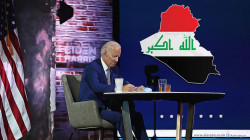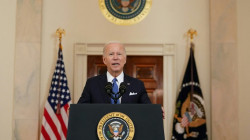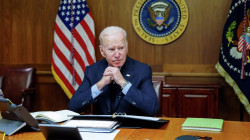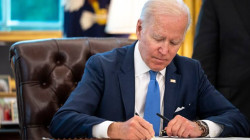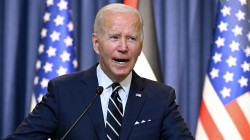Iraqi faction leader threatens Biden with attack broader than "Al-Aqsa flood"
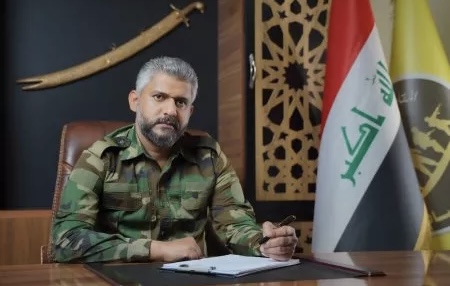
Shafaq News / The head of an Iraqi armed group participating in a coalition of groups that have waged attacks against U.S. troops and Israel has told Newsweek that his forces are prepared to escalate their campaign significantly if President Joe Biden does not meet their demands.
According to Sheikh Mohammed al-Tamimi, secretary-general of Faylaq al-Waad al-Sadiq, all they are asking for is the complete withdrawal of U.S. forces from their country.
The group, whose name translates to the "True Promise Corps," is one of several factions that have banded together as part of the "Islamic Resistance in Iraq," which launched a campaign of near-daily rocket and drone attacks against U.S. forces stationed in Iraq and Syria in October, shortly after the war between Israel and Hamas erupted in the Gaza Strip.
The offensive took a deadly turn in January when three U.S. soldiers were killed on the border of Jordan and Syria.
As unrest worsened with Biden ordering intensive airstrikes and the killing of a high-level armed group commander last month, the Iraqi government began to harden its calls for a timely exit of U.S. forces. The Pentagon soon commenced talks with Iraqi counterparts over a "transition" in the U.S. military presence, which is officially limited to battling the remnants of SIS.
With these assurances, several Islamic Resistance in Iraq armed groups largely paused their campaign, instead turning their sights on Israel itself. But as weeks pass with little sign of progress and reports of new attacks on U.S. positions, Tamimi has warned U.S. troops will be met with an offensive that goes far beyond even Hamas' devastating October 7, 2023, attack on Israel should "the reckless, senile" Biden ultimately fail to withdraw U.S. soldiers from the country.
"If the agreement is not achieved, we will expel the Americans in their coffins from Iraq, and we will humiliate the 'Black House' administration," Tamimi told Newsweek. "And they will see who the resistance is and what the capabilities of the resistance are, especially now that we have drones and long-range smart missiles."
The Rise of Iraq's Shiite armed forces
The presence of largely Shiite Muslim armed groups threatening U.S. troops in Iraq is not a new phenomenon and predates the Israel-Hamas war by more than two decades. When the U.S.-led invasion of Iraq in 2003 toppled President Saddam Hussein, rival Shiite and Sunni Muslim factions took up arms to target one another and U.S. forces viewed as occupiers in the war-torn nation.
While U.S. troops did ultimately exit in late 2011, unrest erupted once again with the rise of the ultraconservative Sunni ISIS, which took over large swathes of the country, declaring a global caliphate from Iraq's second city of Mosul in 2014. Mostly Shiite Muslim militants banded together with support from Iran to tackle the jihadis in Iraq and Syria, while the U.S. formed an international coalition, backed by U.S. boots on the ground, to take on the same foe.
Faylaq al-Waad al-Sadiq was among the groups that engaged in frontline battles against ISIS in both Iraq and Syria during these years.
For a time, the fight against ISIS served as a mutual goal between factions backed by the U.S. and Iran, but militias once again rose up against U.S. troops as tensions between Washington and Tehran worsened. Tit-for-tat hostilities came to a head in early 2020, with the U.S. killing of Islamic Revolutionary Guard Corps Quds Force commander Major General Qassem Soleimani and the second-in-command of Iraq's paramilitary Popular Mobilization Forces coalition, Abu Mahdi al-Muhandis, in Baghdad.
Soleimani is often credited as the architect of the Axis of Resistance, whose influence extends as far as the frontlines of Ukraine, where Faylaq al-Waad al-Sadiq's media channel shared photos last month appearing to show Russian soldiers in Avdiivka carrying a flag carrying the slain commander's face along with another bearing the symbol for the Russian city of Stary Oskol. Soleimani's death sparked vows for revenge among his international supporters.
Today, the war in Gaza has served as a new catalyst for anti-U.S. operations. Various groups such as Kataib Hezbollah, the Nujaba Movement and others have united to form the Islamic Resistance in Iraq, of which Tamimi said Faylaq al-Waad al-Sadiq and its mujahideen, a term referring to Muslim guerilla fighters, were also "an essential part."
"The role of the mujahideen in the corps is to defend the land of Iraq, and this is a right guaranteed by divine laws and international treaties," Tamimi said. "For the leadership and mujahideen of the corps, targeting the American occupation in Iraq is a legitimate, national and moral duty, and Iraq's sovereignty is a duty that everyone must respect."
"The role of the corps' mujahideen was to target any clear American presence and target the Zionist entity," he added.
A Multi-Front War
The latter goal appears to have taken precedence as of late, given an uptick in attacks targeting Israel, including military installations and Ben Gurion International Airport in Tel Aviv. Already faced with a full-scale war in Gaza, the Israel Defense Forces has warned of a "troubling" picture emerging as attacks increase from militias in Iraq and Syria, as well as from other powerful Axis of Resistance factions such as Lebanon's Hezbollah and Yemen's Ansar Allah, also known as the Houthis.
Responding to Newsweek's question during a press briefing Monday, IDF spokesperson Rear Admiral Daniel Hagari asserted that "the connection between Hezbollah, the Houthis, the militias in Iraq, Syria, some armed groups in Syria and not just militias in Syria: all controlled by Iran."
"Iran in a very sophisticated way has occupied Lebanon, Yemen, Iraq and Syria," Hagari said at the time, "using those countries to wage war against Israel, but not just against Israel, it's against Sunni countries and also against innocent civilians of the Western world."
Iranian officials, however, have denied exerting command and control over such groups, which they argue are involved in legitimate defensive maneuvers.
"The military actions undertaken by the resistance front against the Israeli regime are defensive measures aimed at exerting pressure on the occupying regime, with the goal of halting its crimes in Gaza," the Iranian Mission to the United Nations told Newsweek in response to Hagari's comments.
"The Islamic Republic of Iran staunchly supports such resistance," the Mission added. "However, given the Israeli regime's inability to effectively counter the resistance, it seeks to portray Iran as the occupying force in the countries comprising the resistance front."
Tamimi, too, rejected the notion that he led a state-sponsored group. But he attested to a growing level of coordination among allied international factions of the Axis of Resistance.
"Faylaq al-Waad al-Sadiq is Iraqi, and the mujahideen of the corps are Iraqis," Tamimi said. "We have coordination with the resistance factions in Lebanon, Yemen, or Gaza. We do not have coordination with any country, only with the resistance. We are with the unity of the resistance."
'We Will Destroy the American Bases'
With Israel now primarily within the sights of these factions, and operations against U.S. troops having severely declined, Tamimi outlined the strategy behind what the Islamic Resistance in Iraq has referred to as its "second phase" of operations.
"The Iraqi resistance now stands with the Palestinian people, and our duty now is to stand with them and support them against the crime and genocide against them by the Zionist entity supported by the American government, Britain, and Europe," Tamimi said.
"The change in strategies in the Iraqi resistance was clear, especially after the American deal with the Iraqi government, which was urgently asking us to stop the jihadi operations in Iraq," he added. "In return, there will be immediate withdrawal from Iraq, non-interference in the Iraqi situation, and Iraqi money will be handed over."
Once again, he warned that a failure to meet these conditions would result in all-out escalation against U.S. troops, who he warned would meet their end in Iraq.
"We respect the right of peoples to live in peace, and it is our right to have peace in our country without American military forces on the land of Iraq. The Iraqi people respect all peoples but reject the military presence on the land of Iraq," Tamimi said. "If these forces do not withdraw, they will be sent with coffins, and we will destroy the American bases."
"And we are able to carry out more operations than the Hamas movement in its storming of the bases of the Zionist entity," he said. "We are able to shatter these bases."
Already, reports shared by Faylaq al-Waad al-Sadiq's media channel reported a new attack late Tuesday on a U.S. position near the Conoco gas field in eastern Syria's Deir Ezzor province, the site of yet unattributed explosions apparently targeting the militia presence there just a day earlier.
Meanwhile, a high-level Iraqi delegation visited Washington this week ahead of a scheduled trip by Prime Minister Mohammed Shia al-Sudani next month for talks in which the future of the U.S. military presence is likely to be a central topic.
But Tamimi, in a direct appeal to the U.S. people, affirmed that the wrath of the resistance was reserved only for perceived occupiers, and not civilians.
"We wish peace for everyone, and we want to live in peace in our country," Tamimi said. "We ask you to withdraw your children from our country, Iraq, and let us live in security, prosperity and peace. We welcome the American people to visit our country for a tourist or commercial visit, but we reject their military presence, and they must know that we do not need them."
Source: Newsweek
